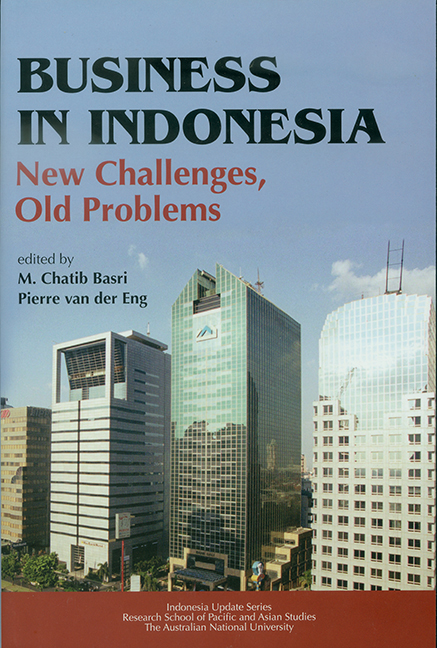Book contents
- Frontmatter
- Contents
- Tables
- Figures
- Contributors
- Acknowledgments
- Glossary
- 1 Business in Indonesia: Old Problems and New Challenges
- PART I Political and Economic Developments
- PART II Overview of the Business Environment
- PART III Foreign Investment and Trade
- PART IV Key Issues in the Business Environment
- 8 The Effects of Decentralisation on Business in Indonesia
- 9 Political Economy of Privatisation of State-owned Enterprises in Indonesia
- 10 Corporate Ownership and Management in Indonesia: Does It Change?
- 11 Tinkering Around the Edges: Inadequacy of Corporate Governance Reform in Post-Crisis Indonesia
- 12 Upholding Indonesian Bankruptcy Legislation
- 13 The Private Sector Response to Public Sector Corruption
- 14 A Challenge for Business? Developments in Indonesian Trade Unionism after Soeharto
- 15 Labour Regulation and the Business Environment: Time to Take Stock
- References
- Index
- Indonesia Update Series
11 - Tinkering Around the Edges: Inadequacy of Corporate Governance Reform in Post-Crisis Indonesia
from PART IV - Key Issues in the Business Environment
Published online by Cambridge University Press: 21 October 2015
- Frontmatter
- Contents
- Tables
- Figures
- Contributors
- Acknowledgments
- Glossary
- 1 Business in Indonesia: Old Problems and New Challenges
- PART I Political and Economic Developments
- PART II Overview of the Business Environment
- PART III Foreign Investment and Trade
- PART IV Key Issues in the Business Environment
- 8 The Effects of Decentralisation on Business in Indonesia
- 9 Political Economy of Privatisation of State-owned Enterprises in Indonesia
- 10 Corporate Ownership and Management in Indonesia: Does It Change?
- 11 Tinkering Around the Edges: Inadequacy of Corporate Governance Reform in Post-Crisis Indonesia
- 12 Upholding Indonesian Bankruptcy Legislation
- 13 The Private Sector Response to Public Sector Corruption
- 14 A Challenge for Business? Developments in Indonesian Trade Unionism after Soeharto
- 15 Labour Regulation and the Business Environment: Time to Take Stock
- References
- Index
- Indonesia Update Series
Summary
Few would dispute that better corporate governance is important to Indonesia's recovery from the economic crisis of 1997–98. With a significant number of major banks and corporations still under the control of the Indonesian Bank Restructuring Agency (IBRA), the process of divestment will succeed only if prospective investors are confident that their investments will be managed in their own best interests. Equally, with equity markets weak and bank financing likely to remain dominant, improving management and lending practices in the banking sector will be essential to both reducing the cost of capital and preventing future liquidity and capital account crises.
What regulatory reforms, then, have been introduced since 1997 to improve corporate governance in Indonesia? The most significant are a National Code of Corporate Governance (‘the Corporate Governance Code’), Decree No. 117/2002 of the Minister for State Enterprises concerning good corporate governance in state-owned enterprises (SOEs) (‘the Ministerial Decree’), and Jakarta Stock Exchange (JSE) Regulation No. I-A (‘the JSE Regulation’).1 Other activities of note include the circulation of draft new company and capital market laws, the institution of ‘annual report awards’ for listed companies, and the creation of a number of NGOs and NGO-related programs to ‘socialise’ better corporate governance practices in Indonesia (ADB 2003).
This chapter briefly considers how well these regulatory measures are likely to improve corporate governance in Indonesia. It will argue that they have some merit in themselves but ultimately will have little effect on the central problem, which is the interaction between institutional corruption and family-owned corporate conglomerates. First, I introduce this argument by canvassing the main characteristics of Indonesian corporate governance. Then I consider corporate governance-related reforms since 1997, including the Corporate Governance Code and the mandatory requirement for independent commissioners and audit committees in listed enterprises and SOEs. In particular, I argue that these reforms have not adequately addressed the question of conflicts of interest and related party dealings. I conclude with an overview of reforms that would better address this fundamental issue.
THE NATURE OF THE PROBLEM: INDONESIAN CORPORATE
GOVERNANCE BEFORE AND AFTER 1997
Corporate Governance before 1997
Before the 1997 crisis, corporate governance in Indonesia had three main characteristics. First, large corporations exhibited highly concentrated ownership patterns, often within the context of family control and a diversified conglomerate structure (Claessens, Djankov and Lang 1999; Husnan 2000: 19–23).
- Type
- Chapter
- Information
- Business in IndonesiaNew Challenges, Old Problems, pp. 178 - 190Publisher: ISEAS–Yusof Ishak InstitutePrint publication year: 2004



